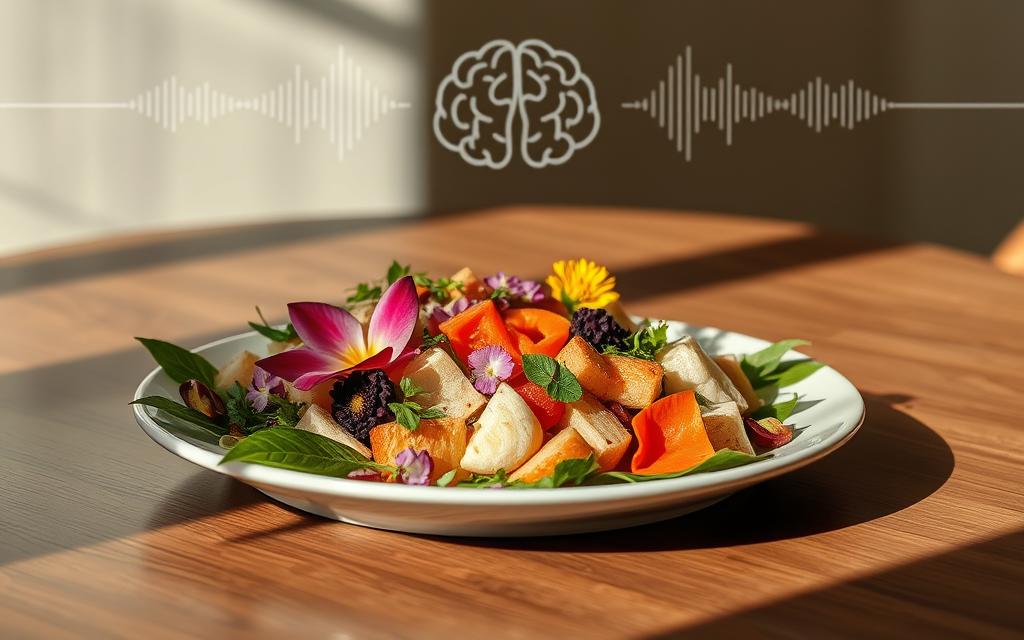Have you ever eaten a meal without even noticing it? We all have those moments when we eat for comfort, reward, or habit. Research shows that emotional reasons cause 75% of overeating1. This shows how much our feelings affect our eating.
Many of us feel guilty after eating too much. But, what if we could enjoy our meals more? Mindful eating can help us do just that. It makes us more aware of our eating and the feelings it brings. This way, we can stop overeating and enjoy our food again2.
Key Takeaways
- Mindful eating helps establish a healthier relationship with food.
- Awareness can significantly reduce episodes of emotional eating.
- Emotional triggers contribute to over 75% of overeating.
- Practicing mindfulness may lead to better self-regulation during meals.
- Understanding hunger cues can aid in recognizing when to eat.
Introduction to Mindful Eating
In today’s fast world, many of us eat quickly, with most Americans taking less than 30 minutes for lunch3. This rush can harm our eating habits and make us less connected to our meals. Mindful eating offers a new way by asking us to be fully present while we eat. It changes how we see food by making us more aware3.
Mindful eating helps us see how our eating habits affect our health and feelings. For example, binge-eating affects 1-3% of people and can be linked to stress and dieting4. It often leads to eating more processed foods, which are high in sugar and fat. This is a big problem in the U.S., where about 42.4% of adults are obese4.
By focusing on mindful eating, we can enjoy our meals more and choose better foods. Research shows that mindfulness can cut binge-eating by 50% in those who try it4. It helps us eat more balanced and can even help us lose weight, with most losing 5-10% of their body weight in 6-12 months4.
By using mindful eating, we can better connect with our bodies and hunger signals. This leads to a more fulfilling and healthy eating experience. In a world full of distractions, it’s crucial to value our meals. Mindful eating teaches us to eat without distractions for at least 20 minutes3.
Understanding Overeating and Its Consequences
Understanding overeating is key to tackling its effects. Overeating can lead to weight gain, obesity, and health problems. It often starts as a way to cope with stress, turning into binge eating.
Binge Eating Disorder (BED) is common in the U.S., affecting many who seek weight loss. It’s more common than anorexia and bulimia combined. To be diagnosed with BED, someone must binge eat at least once a week for three months5.
These episodes are marked by eating a lot in a short time. People often feel out of control and guilty afterward. This affects their health and well-being.
A study found that binge eating can involve eating quickly or until feeling uncomfortable5. Feelings of disgust, depression, or guilt often follow. Weight stigma and the weight loss industry can make things worse5.
Worldwide, 70 million people struggle with eating disorders, a major health issue6. In industrialized countries, up to 5% of the population is affected6. Eating disorders have a strong genetic link, making them complex6.
Our biology, including hormones and genes, plays a role in overeating. Genes like SLC6A4 and DRD2 are linked to eating disorder severity6. Understanding these factors is crucial in addressing overeating’s impact on people’s lives.
What is Mindful Eating?
Mindful eating means being fully present and using all our senses when we eat. It helps us enjoy our food more and have a better relationship with it.
Origins of Mindful Eating
Mindful eating comes from Buddhist traditions. These traditions teach us to be aware and present in the moment. This way, we can make our eating habits more mindful, which helps with eating disorders.
Key Principles of Mindful Eating
There are important principles for mindful eating:
- Being Present: Eat without distractions, enjoying the taste and texture of our food.
- Listening to Our Bodies: Pay attention to when we’re hungry or full to eat right.
- Practicing Gratitude: Be thankful for the food we eat, building a positive connection with it.
- Controlling Portions: Use smaller plates and utensils to eat the right amount7.
- Avoiding Environmental Distractions: Turn off devices and avoid talking to eat better.
By following these principles, we can use mindfulness to stop binge eating. Binge eating affects about 3% of people, leading to obesity8. Mindful eating also helps us feel better mentally7.
The Science Behind Mindful Eating
The science of mindful eating shows us how it changes our eating habits. It teaches us to eat slowly and notice when we’re full. This approach helps us eat better, making mindful eating a key part of our diet9.
How Mindfulness Affects Eating Behaviors
Studies show that mindfulness can help reduce binge eating. When we combine mindfulness with cognitive behavioral therapy, we see less emotional eating10. Mindfulness also helps us ignore tempting food packaging and listen to our body’s hunger signals10.
Studies Supporting Mindful Eating
A review of 68 studies found that mindful eating improves our eating habits. But it doesn’t always lead to weight loss. For example, a study with 194 adults with obesity found that mindfulness reduced sweets intake and kept blood sugar levels stable9.
While some participants lost weight, the difference was small. This shows that mindfulness alone might not be enough. We need other methods too9.

Mindful Eating vs. Mindless Eating
Mindful eating and mindless eating are two different ways we eat. Mindless eating happens when we’re distracted, like watching TV or using our phones. This can make us eat more than we want to11.
On the other hand, mindful eating means paying full attention to our food. It helps us enjoy our meals more and eat better12. By focusing on our food, we can control our emotions better and make healthier choices11.
Mindless eating can mess with our energy and hormones12. But mindful eating can help us feel more balanced and reduce stress about food11. James Rouche says starting with one mindful meal a day can be a great first step.
| Aspect | Mindful Eating | Mindless Eating |
|---|---|---|
| Awareness | High | Low |
| Caloric Intake | Regulated | Excessive |
| Food Choices | Health-focused | Convenience-driven |
| Emotional Impact | Reduced anxiety | Possible binge eating |
| Enjoyment Level | Increased satisfaction | Decreased enjoyment |
Exploring the differences between mindful and mindless eating helps us make better choices. It’s about understanding how our eating habits affect our health1211.
Why Should You Try Mindful Eating?
Mindful eating changes how we see food, making meals a chance to care for our bodies and minds. It’s not just about feeling good right away. It also helps with keeping a healthy weight and improves our emotional health.
Benefits for Weight Management
Mindful eating helps us eat less and slower. Studies show eating slowly can cut down on how much we eat, leading to fewer calories13. It teaches us to listen to our hunger, so we eat when we’re really hungry and stop when we’re full14.
This method stops unhealthy cravings and helps us eat better. It’s key in avoiding overeating and binge eating14. Using smaller plates and taking smaller bites also helps control how much we eat13.
Connection to Emotional Well-Being
Mindful eating is deeply linked to our emotional health. It lowers stress and anxiety, making meals better for our mental health13. Enjoying flavors and textures more makes meals more satisfying.
It helps us have a better relationship with food, leading to healthier choices. By eating healthy most of the time and enjoying treats sometimes, we find a balance14.

Learning to Identify Hunger Cues
Understanding hunger cues is key to mindful eating. It helps us have a better relationship with food. By learning to identify hunger cues, we can tell the difference between physical vs emotional hunger. This helps us avoid unhealthy eating habits.
Differentiating Between Physical and Emotional Hunger
Physical hunger shows up in different ways, like feeling irritable, getting headaches, or feeling tired. Emotional hunger is about eating due to feelings, like boredom or seeking comfort. Knowing the difference is crucial for our eating habits.
Physical hunger is our body’s way of saying it needs energy. Emotional hunger comes from our feelings and situations. We need to listen to our bodies to avoid eating mindlessly.
Recognizing Unhealthy Eating Triggers
Mindful practices can help us avoid unhealthy eating triggers. Busy lives or certain meds can make it hard to know when we’re hungry15. By spotting these triggers, we can make choices that support our health.
Good sleep and self-care help us better hear our hunger signals15. It’s important to create a space where we can listen to and act on our hunger cues. This supports healthier eating.
Mindful Eating Techniques to Curb Overeating
Mindful eating can help us eat less and feel better about food. It’s about slowing down and being thankful for what we eat. This makes our meals more enjoyable and improves our health.
Slowing Down Your Eating Pace
Slowing down helps our brain feel full. Studies show we need about 20 minutes to feel full after eating16. By chewing well and pausing between bites, we eat more mindfully. This stops us from eating too much.
Fostering Gratitude for Your Food
Being thankful for our food makes meals better. Thinking about where it comes from and how it’s made makes us appreciate it more. This helps us enjoy our food and avoid bad eating habits17.
Mindful Eating and Weight Loss
Mindful eating can be a great way to lose weight and keep healthy habits. It helps us pay more attention to how we eat. This can lead to lasting changes in our eating habits.
Studies show that mindful eating can help us eat less when we’re stressed or upset. This is important because eating too much when we’re stressed can lead to weight gain. A study found that people who practiced mindful eating ate less and felt better about food18.
Mindful Eating as a Long-Term Strategy
Mindful eating helps us understand when we’re hungry and what makes us want to eat. It makes us think more about our food choices and how we eat. This can lead to eating healthier and controlling our portions better.
Using smaller plates or planning meals can help us make better food choices. It can also reduce the urge to eat impulsively19. This approach makes eating more enjoyable and helps us stick to our weight loss goals for the long term20.
Real-Life Success Stories
Many people have found success with mindful eating. They’ve improved their relationship with food and managed their weight well. For example, those who join mindful eating programs often eat less and feel less anxious18.
They also learn to listen to their bodies better. This leads to lasting changes in their eating habits20. These stories and studies show that mindful eating can be a powerful tool for weight loss.
Addressing Binge Eating and Overeating Disorder
Binge eating disorder (BED) is common, affecting about 2.8% of adults in the U.S. at some point. It impacts 1.6% of adult women and 0.8% of adult men. People with BED often eat too much at least once a week for three months or more, which is dangerous21.
It’s important to tackle overeating disorder with the right strategies. Cognitive Behavioral Therapy (CBT) helps by looking at behaviors and thoughts behind eating habits22. Interpersonal Therapy (IPT) also helps, focusing on solving conflicts linked to binge eating22.
BED can also be linked to other eating disorders like bulimia nervosa, where people try to make up for binge eating21. Those with BED might also face malnutrition, leading to cravings for unhealthy foods. A meal plan can help reduce stress about food choices22.

Knowing how common BED is and the treatment options is key to finding solutions. Working together with healthcare experts is crucial for treating BED22. Mindful eating and therapy can help those struggling with BED towards a healthier path.
How to Practice Mindful Eating Daily
To make mindful eating a part of our lives, we need a supportive environment and daily exercises. A calm place to eat helps us enjoy our food and listen to our body’s hunger and fullness signals.
Creating a Mindful Eating Environment
Creating a mindful eating space means less distraction and more focus on food. Here are some steps:
- Choose a spot for meals where screens are off, helping us focus on food and talk.
- Use colors and dishes that make meals feel special, encouraging us to slow down.
- Eating with others can make meals more enjoyable and help us eat just the right amount23.
Simple Exercises to Begin with
Starting with simple mindful eating exercises can change how we see food. Here are a few:
- Eat a small food like a raisin slowly, noticing its taste and texture. This can make us enjoy healthier foods more23.
- Plan out when to eat, avoiding eating too much or too little14.
- Chew each bite 20 to 40 times for better digestion and understanding when we’re full24.
By making these small changes, we can improve our eating habits. Regular mindful eating helps us enjoy meals more and understand our hunger and fullness better. These habits lead to a healthier relationship with food, helping us meet our mindful eating goals1424.
Overeating: Understanding Its Triggers
Figuring out why we overeat is key to changing our habits. We must look at both outside factors and our emotions. These can greatly influence how much we eat.
External Influences on Eating Habits
Our surroundings shape our eating habits. Having food always available at home can lead to eating too much25. Social events, like parties, can also make us eat without thinking25. Plus, eating with others can make us eat more because we match our pace25.
Setting regular meal times helps control our hunger. It keeps our hunger hormones in check25.
Emotional Factors Leading to Overeating
Feeling stressed, bored, or celebrating can make us eat more25. For people on the autism spectrum, eating can be a way to calm down or feel something26. Stressful times often lead us to turn to food for comfort25.
Not getting enough sleep can also make us crave more food25. Being mindful when we shop and cook can help us avoid buying too much. This can prevent us from eating too much25.

The Role of Nutrition in Mindful Eating
The role of nutrition in eating habits is key to mindful eating. Eating foods full of essential nutrients boosts digestion and nutrient absorption. This improves our overall health. Studies show that mindful eating can lead to better digestion by allowing for optimal nutrient absorption27.
By enjoying the flavors and textures of food, we enjoy our meals more27.
Choosing a balanced diet shapes our eating habits. Eating fruits, vegetables, whole grains, lean proteins, and healthy fats gives us all the vitamins and minerals we need28. These foods support our health and help us have a better relationship with food. This reduces emotional eating, which affects about 40-60% of adults29.
Using mindful eating techniques, like eating slowly and without distractions, helps us feel fullness cues better. Eating slowly can cut food intake by 15-20%27. Removing distractions lets us focus more on our meals, paying 30% more attention29.
Using a hunger/fullness scale helps us eat wisely, aiming for a balanced state of fullness27. This self-awareness can greatly improve our eating habits.
Resources for Further Exploration of Mindful Eating
As we start our mindful eating journey, many mindful eating resources are available. These resources come in different forms, like books and online platforms. They help deepen our understanding and use of mindful eating.
Books and Online Courses
Books on mindful eating give us the basics and useful tips. They show how paying attention to food can make eating better30. Online courses also teach mindfulness in our meals, helping us eat less and feel fuller30.
Learning about mindful eating is key. It teaches us to eat with care, not just follow strict diets.
Guided Meditations and Workshops
Workshops offer a hands-on way to learn. They let us practice mindful eating with others, making it more fun. Guided meditations focus on the emotional side of eating.
Research shows that most adults eat for reasons other than hunger, like emotional needs30. Understanding this helps us eat better and reach our health goals.

Potential Pitfalls of Mindful Eating Practices
When we start mindful eating, we face some challenges. Misunderstanding mindfulness can lead to frustration. Also, expecting quick results can make it harder to stick with it. Knowing these obstacles is key, as studies show mindfulness can greatly improve how we eat.
A study found mindfulness cuts binge eating by about 50%31. But, about 15% of people start eating too much again within three months31. This shows we need to work on keeping it up over time.
Learning to listen to our hunger and fullness signals is a big part of mindful eating. It takes time, but it can lead to a 60% better understanding of these signals31. Still, controlling portion sizes remains a challenge, even with mindfulness31.
For those with serious eating issues, getting professional help is crucial. Emotional eating, often tied to anxiety and depression, needs special attention. It’s linked to unhealthy eating habits, making mindful eating harder32.
Despite its benefits, mindful eating comes with its own set of challenges. By understanding these, we can approach it with better expectations and support when needed.
Conclusion
Mindful eating is a powerful tool for changing how we view food. It helps us understand our hunger and appreciate our meals. This practice can help us stop overeating and improve our health.
It’s important to know why we eat the way we do. Studies show that some foods can act like drugs in our brains, making us eat more than we need3334. Mindful eating teaches us how to deal with these cravings, helping us manage our weight and live better.
By making mindful eating a part of our lives, we take care of our health. We learn to recognize what drives our eating and make better choices. This leads to a healthier, happier life.
FAQ
What is mindful eating?
Mindful eating means being fully present and aware when we eat. It involves using our senses and listening to our body’s hunger signals. This practice helps us have a healthier relationship with food and can stop us from eating too much or eating because we’re upset.
How can mindful eating help with overeating?
Mindful eating helps us know when we’re hungry and when we’re full. This stops us from eating too much. By eating slowly and enjoying our food, we can still enjoy it but know when to stop, breaking bad eating habits.
What are some techniques for practicing mindful eating?
To practice mindful eating, eat slowly and focus on how food tastes and smells. Pay attention to when you’re hungry or full. Being thankful for our meals helps too. These steps help us make better food choices and avoid bad eating habits.
Can mindful eating support those with binge eating disorder?
Yes, mindful eating can help those with binge eating disorder. It helps them notice when they’re feeling emotional and find better ways to deal with it. This approach gives them tools to manage their urges and improve their relationship with food.
What role does nutrition play in mindful eating?
Knowing what’s in our food makes mindful eating better. When we choose nutritious foods, we make choices that are good for our health. This aligns with the goals of mindful eating.
What are some common challenges faced when practicing mindful eating?
Challenges include misunderstanding what mindful eating is and setting unrealistic goals. It can also be hard to change how we eat because of emotions. It’s important to be flexible and seek help, like from a professional, if we have serious eating issues.
How can we create an environment conducive to mindful eating?
To eat mindfully, remove distractions and have a special place for eating. Prepare meals with care. Simple steps like breathing before we eat and not using our phones can also help us be more present.
Are there resources available to help us with mindful eating?
Yes, there are many resources like books, online courses, and workshops. These offer insights and strategies to make mindful eating a part of our daily lives.
